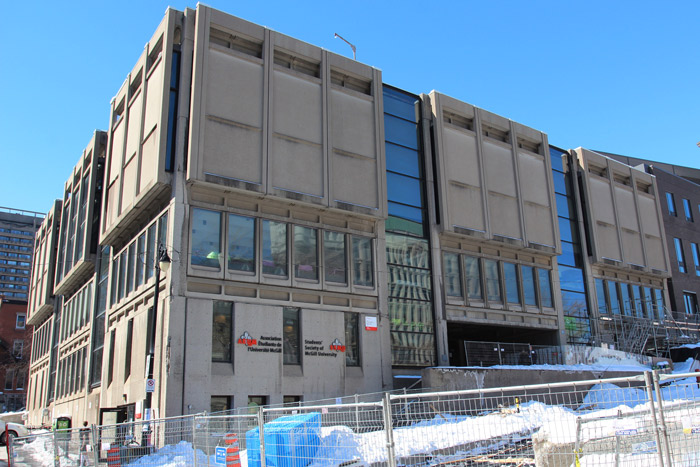On Feb. 20 at the Students’ Society of McGill University (SSMU) Winter 2017 General Assembly (GA), the Motion Regarding Policy Against Ancillary Fee Increases was introduced by Vice-President (VP) University Affairs Erin Sobat.
The motion was approved at the GA and scheduled for online ratification until, according to Sobat, the SSMU executives were informed of a pre-existing and contradictory contract with the McGill administration.
Had it been enacted, motion would have had SSMU not approving referenda questions for increasing ancillary fees, also known as frais institutionnels obligatoires (FIOs) or mandatory institutional fees, until the university met certain conditions. Some of these conditions include implementing a moratorium on increasing overhead charges, developing a transparent formula for overhead fees, and McGill providing yearly financial information to the Executive Committee about the distribution of all ancillary fees by SSMU members.
The motion was moved due to concerns about overhead fees that are charged to fee-funded units, such as Student Services, Student Housing and Hospitality Services, and Athletics and Recreation. Yearly budgets of the above units would each need to be approved by a university committee with at least parity student representation.
Currently, both graduate and undergraduate McGill students are required to pay annual non-opt-outable FIOs that support fee-funded units. These fees vary from approximately $1,500 to $3,000, depending on the student’s residency status and program of study.
“The fees that you would have to pay […] that are not part of the tuition […] would be the student services fees,” Kyana Alexandre, student services secretary, said. “You would have to pay fees for [services, such as] the student society, the transcripts and diploma, and the McGill writing centre […] a lot of them are not expensive, but it’s just that they accumulate.”
According to the motion, required university overhead charges for fee-funded units have risen significantly since 2010. Overhead fees are not regulated and are exempt from ministerial control in Quebec, meaning that universities are able to change overhead fees through a referendum process, but without provincial restriction. These overhead fees fund resources such as legal, accounting, and maintenance services—which are not provided through the central university operating budget.
Governmental regulation of ancillary and overhead fees is difficult, as fees can be numerous and vary greatly between different institutions, while power over these fees are usually distributed among different administrative services.
The Post-Graduate Students’ Society (PGSS) Secretary-General Victor Frankel said that PGSS does not have a contract similar to SSMU’s.
“The requirement for PGSS to run a referendum on [FIOs] specifies that [the Legislative Council] initiates the process, but [the university] can’t compel us to run a referendum if, [after we] initiate it, Council votes to not put the question out,” Frankel said.
PGSS’ ability to vote on fee increases before they are put to referendum was demonstrated on Feb. 15, when the PGSS Legislative Council vetoed a request for an ancillary fee increase from McGill Athletics and Recreation.
“The university […] said that PGSS has to put the motion up for referendum, but PGSS responded that if they were compelled to initiate the process […they] complied with the mandate by putting the question up to Council,” Frankel said.
According to Sobat, services that are funded by [FIOs] are charged overhead fees because they are not considered to be part of the university’s main operating budget.
“The issue is that there is no formula for determining how those charges are levied and they have been increasing exponentially the past few years, alongside overall budget cuts to the university,” Sobat said.
Sobat wrote in an article for The McGill Daily in September 2016 that overhead charges on Student Services have increased from $30,679 in 2009 to $651,385 in 2016. According to Sobat, SSMU cannot legally renegotiate their contract with the university.
“It’s indefinite, so there’s no end date on this agreement,” Sobat said. “[….] I’m not sure that the current Executive is in a position to look into the full legal scope of this contract. I would certainly encourage the next Executive to do so […] to ensure that [SSMU’s] rights [as] a student association are being respected.”
Frankel also believes that students should have more control over fees.
“A lot of […] services that should be provided [to students] by the university are being pushed on to students through all these extra fees,” Frankel said. “[….] If we’re paying for these services, there needs to be a specific effort to provide as much transparency as possible.”







